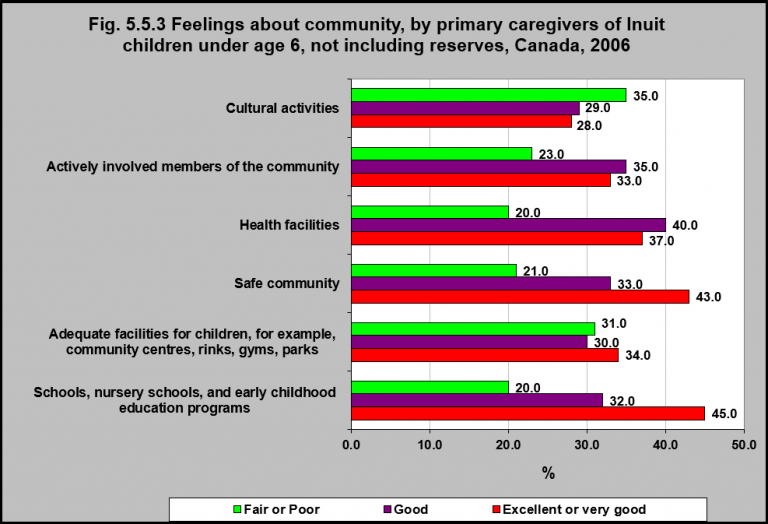Feelings about community, by primary caregivers of Inuit children under age 6, not including reserves, Canada, 2006

Notes:
Percents may not add up to 100 because responses of ‘don’t know’, ‘refusal’ and ‘not stated’ were included in the calculation of all estimates and rounding.
Not stated’ includes ‘not stated’, ‘don’t know’ and ‘refusal’.
Questions answered by Person Most Knowledgeable (PMK).
Source: CICH graphic created using data adapted from Statistics Canada, Aboriginal Children’s Survey, 2006. http://www.statcan.gc.ca/pub/89-634-x/2008005/t/6000039-eng.htm -accessed August 22, 2017.
In 2006, when asked their feelings about their community, 45% of primary caregivers of children under 6 years of age felt their schools, nursery schools and early child education (ECE) programs were ‘excellent’ or ‘very good’.
Forty-three percent felt their community safety was ‘excellent’ or ‘very good’ and 37% felt the same way about their health facilities.
Availability of facilities for children such as community centres received an ‘excellent’ or ‘very good’ rating with 34% of primary caregivers feeling this way, while 35% felt cultural activities offered for children under 6 were ‘fair’ or ‘poor’.
Implications
Indigenous communities, especially in rural and remote locations, often lack amenities which contribute to the health, wellness, cultural survival and quality of life of individuals and communities. Access to health, physical activity, recreation, cultural, and educational programs and services is essential for promoting health and addressing the social issues that are prevalent in many Indigenous communities. Participation in community programs and activities can contribute to the building of self-esteem and the necessary skills and traits which foster individual and collective resilience.
